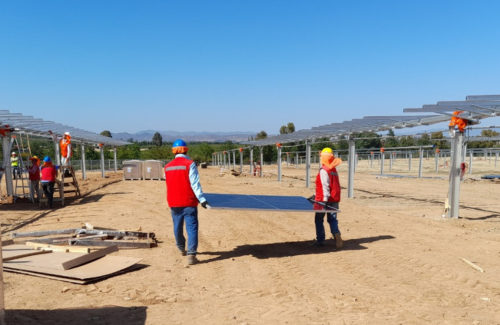California-based solar panel assembler Auxin Solar has filed a new petition with the Dept. of Commerce asking for a review of solar panel imports from Cambodia, Malaysia, Thailand and Vietnam using components from China as a way to avoid antidumping and countervailing (AD/CV) duties against Chinese imports. Commerce has one month to decide whether to take up the case.
A similar petition was denied by Commerce last year. Whereas the 2021 petition requested review of a limited number of Chinese companies by name, this new petition asks for a review of all imports coming from four Southeast Asian countries that use Chinese components.
AD/CV duties have been in place against Chinese solar manufacturers since 2012. Auxin Solar is claiming that Chinese solar panel makers are shipping solar cells to facilities in Southeast Asia to finish assembling panels to avoid paying the duties.
U.S. imports of Chinese panels have dropped in the last decade, while the majority of imported solar panels are coming from Southeast Asia. A report last year stated that solar panels from Malaysia, Thailand and Vietnam made up 80% of U.S. crystalline silicon module supply in the first half of 2021.
Cambodia is a new addition to this discussion. Imports from the country were virtually nonexistent before 2018. The country was excluded from separate Section 201 tariffs on imported solar panels since it contributed less than 3% of total imports to the United States. Auxin Solar claims that due to the exclusion, Chinese solar companies began shifting operations to Cambodia, and now the country warrants a closer look.
While Auxin Solar does call out companies by name in the petition, Commerce is being asked to look at the countries as a whole rather than individual players. This differs from the 2021 petition, which came from a group of anonymous U.S. manufacturers calling themselves American Solar Manufacturers Against Chinese Circumvention (A-SMACC). The companies claimed anonymity because they were fearful of retaliation by the Chinese companies they named. The petition was largely denied because of that anonymity (Commerce could not determine the anonymous companies’ business dealings in the mentioned countries) and because calling out specific companies went against the requirements of the Tariff Act of 1930 (which looks at countries rather than companies).
In 2015, Commerce completed a similar investigation into Chinese solar companies shifting production of solar cells to Taiwan as a way to avoid the antidumping tariffs. Commerce did find the Taiwan operations at fault and tariffs were extended to the country.
During last year’s petition discussion, many in the U.S. solar installation community were feeling the affects of the suggested tariffs. In addition to global supply chain issues, the 2021 petition had spooked some module exporters, leading to fewer solar panels entering the country. In September, George Hershman, president of SOLV Energy, the country’s largest solar EPC with 3,000 employees nationwide, said the petition was affecting the company’s ability to plan for future projects.
“Module deliveries to the U.S. have frozen. This isn’t something in the future. Just the submitting of this petition has essentially frozen the market,” he said. “We can’t get module manufacturers today to sign purchase orders that we need to deliver projects in the near-term because of the concern of whether there will be a 50 to 250% tariff when those modules hit the port. Nobody can take that cost risk, so it’s essentially stopping projects going forward.”
Hershman stated that SOLV Energy was already contracted for 4.5 GW of solar installations in 2022 and the suggested tariffs had put “almost 100% of that work” at risk. “To say that this is a small issue or a nuanced issue is clearly an understatement. This has significant risk to our business and those thousands of employees. This is about whether or not we hire 3,000 or 4,000 employees to deploy the projects we have under contract or we start laying off employees in 30 days,” he said in September.
Although Commerce denied that 2021 petition, the battle begins again.
Abigail Ross Hopper, president and CEO of the Solar Energy Industries Association (SEIA), released a statement on the development:
This is yet another attempt to abuse U.S. trade laws and cause serious economic harm to the American solar industry and its 230,000 workers, shockingly, all at the behest of a single company. SEIA will aggressively oppose this petition.
As President Biden recognized just last week, there is a way to increase American manufacturing in the solar supply chain and it is an approach that has widespread support. Passing climate and energy provisions in Congress with Senator Ossoff’s Solar Energy Manufacturing for America Act would generate tens of billions of dollars in investment in U.S. manufacturing.
This frivolous, self-interested petition could derail the entire American solar energy industry and disable efforts to tackle the climate crisis.






